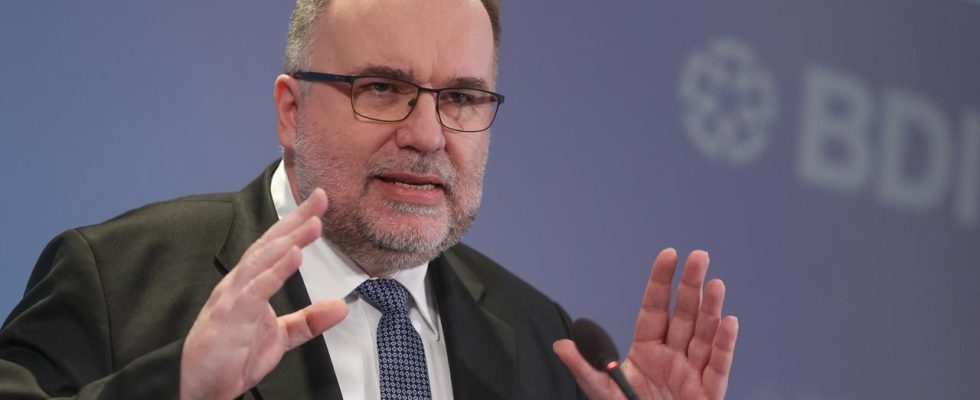How can German industry produce in a more climate-friendly way while remaining competitive? Minister Habeck’s proposals are generally met with approval from the BDI. But President Russwurm is pushing for concrete relief.
Last week, Economics Minister Robert Habeck (Greens) presented his new industrial strategy – today he is meeting representatives from companies and unions at the sixth industrial conference. Important topics should include the competitiveness of German companies, climate protection, the supply of raw materials and digitalization.
Habeck’s proposals for an industrial policy that is strongly geared towards state support are largely met with approval from the Federation of German Industries (BDI). At the start of the meeting, BDI President Siegfried Russwurm said he was offering the federal government cooperation on the industrial strategy. The country must remain strong in the face of the current crises and with a view to the “three Ds” – decarbonization, digitalization and demographic change.
It is about “making Germany resilient as an industrial location” and further developing it for the future. The federal government’s commitment to the industry was “overdue”. What is now required is the right framework and not small-scale regulations.
demands for Industrial electricity price
Russwurm sees a need for action in energy policy – here he also mentioned the low industrial electricity price demanded by Habeck. He also called for accelerated planning and approval procedures, a reduction in bureaucracy and more efforts in digitalization.
In the run-up to the conference, DGB chairwoman Yasmin Fahimi also campaigned for low industrial electricity prices. “Without competitive energy prices, the energy-intensive basic industry is running against the wall. Companies now need planning security. That’s why the federal government must finally deliver and introduce a bridge electricity price until renewable energies are massively expanded and electricity prices fall again on their own,” Fahimi told the dpa news agency .
If this does not happen, the coalition risks the departure of large parts of industry and thus an enormous loss of added value, employment and prosperity.
Tax relief and funding for investments
With the new strategy, Habeck wants to position Germany as a strong industrial location again and “preserve it in all its diversity,” as he explained last week. According to his paper, glass, cement and paper will continue to be produced in Germany in the long term. The Green Minister advocated tax relief and funding for business investments. There should also be incentives for people who want to continue working after retirement age. Anyone who stays in the job longer can have their employer’s contribution to unemployment and pension insurance paid out directly.
The controversial topic of the debt brake
In this context, he questioned the debt brake that Finance Minister Christian Lindner is insisting on. It is necessary to “check whether the financial policy rules we have set ourselves still fit at this time,” said Habeck. The coalition agreement, including the debt brake, applies to this legislation – but one can also think beyond that.
The German Federation of Trade Unions also spoke out in favor of reforming the debt brake. “If you want to successfully transform the industry, you have to invest now – this applies to public budgets as well as the private sector,” said DGB boss Fahimi to the dpa. The debt brake is increasingly becoming a brake on the future. It must finally be reformed.

